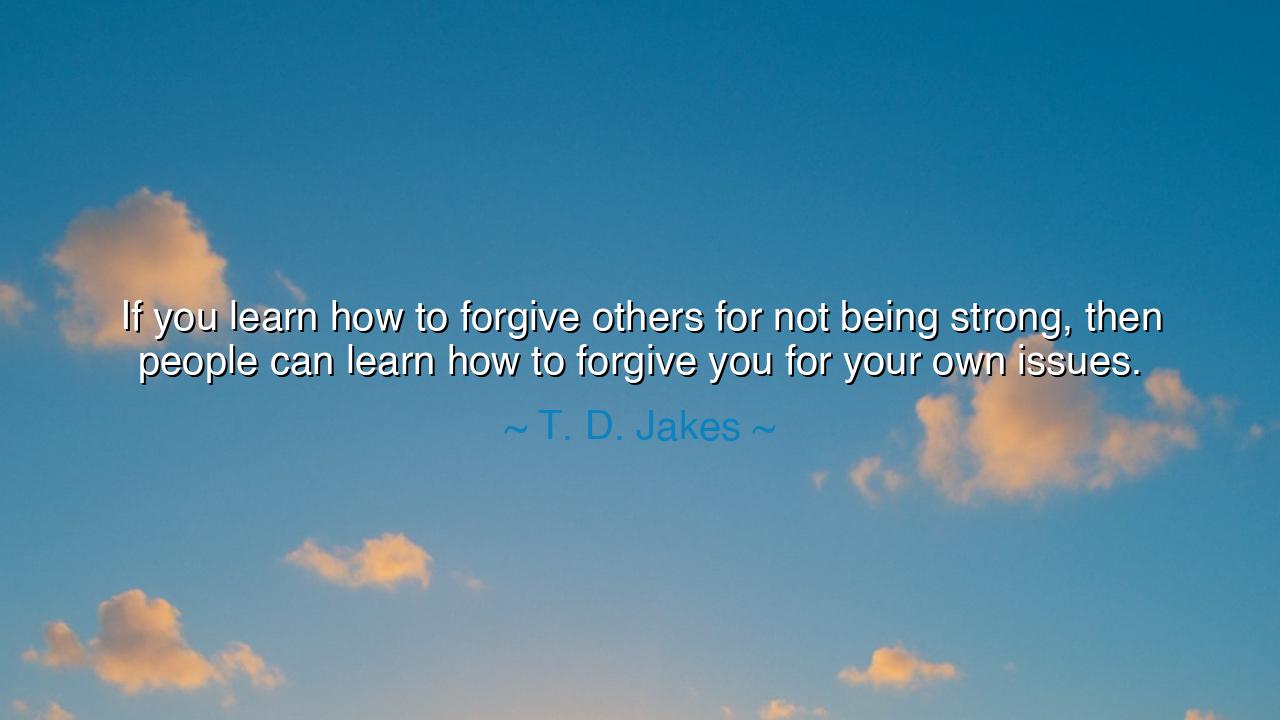
If you learn how to forgive others for not being strong, then
If you learn how to forgive others for not being strong, then people can learn how to forgive you for your own issues.






“If you learn how to forgive others for not being strong, then people can learn how to forgive you for your own issues.” Thus speaks T. D. Jakes, a voice of wisdom in our age, yet carrying the timeless rhythm of the ancients. In this saying lies a truth older than kingdoms: that forgiveness is the bridge that binds souls together, and that compassion toward the weakness of others becomes the seed of mercy planted for ourselves. To demand strength from all men and women is folly, for none walk without stumbling; but to forgive the faltering is to prepare a path for your own faltering to be forgiven in turn.
The ancients knew this well. Among them, the Greeks spoke of Nemesis, the goddess who punished arrogance, and of Eleos, the spirit of mercy. They understood that justice without compassion is cruelty, and compassion without justice is weakness. T. D. Jakes’ words point to this balance: that when we see others fall short of strength, our choice to show mercy teaches the world that we too are worthy of mercy when our own burdens crush us. For what man has not been bowed by sorrow, what woman has not trembled under grief? To condemn others is to condemn oneself; to forgive others is to forgive the human condition itself.
Consider the life of Abraham Lincoln, who bore the weight of civil war and the anger of a divided nation. He was mocked, despised, and betrayed by those around him, yet he held fast to a spirit of forgiveness. After the Union’s victory, he did not cry for vengeance upon the South, though he could have. Instead, in his second inaugural address, he spoke of binding wounds “with malice toward none, with charity for all.” In forgiving others for not being strong, he modeled mercy so profound that it continues to inspire the ages. His legacy is not only victory, but compassion.
For the truth is this: to hold others to impossible standards of strength is to build walls of judgment. And those walls, once raised, will trap you inside them when your own failures appear. But when you lower those walls with forgiveness, you create a community where love flows, where each person bears the other’s weakness, and in return, their weakness is borne as well. Forgiveness is not indulgence; it is recognition of the fragile clay of which all humanity is made.
O children of tomorrow, hear this: be gentle when others stumble, for one day you too will stumble. Do not mock the one who falters under life’s burden, for the same burden will one day rest on your shoulders. Extend your hand to the broken, not only to lift them, but also to remind yourself that when your hour of weakness comes, a hand will be extended to you. This is the cycle of mercy, the covenant of forgiveness that binds humanity together across generations.
The lesson is plain: forgiveness is both seed and harvest. When you forgive, you plant mercy in the soil of the soul. In time, it will return to you as compassion from others. Withhold forgiveness, and you sow bitterness, which will grow into loneliness when your own failures come. Thus, to forgive is not only kindness to others but wisdom for yourself.
Practically, let each person do this: when anger rises at another’s weakness, pause and remember your own. Speak not first with judgment, but with understanding. Say aloud, “I too have fallen; I too will fall again.” Practice forgiveness not as a single act but as a discipline—daily, deliberate, unwavering. In doing so, you will teach the world how to treat you when your own heart trembles under its burdens.
So let T. D. Jakes’ words be etched upon your spirit: “If you learn how to forgive others for not being strong, then people can learn how to forgive you for your own issues.” For in forgiveness lies freedom, in compassion lies strength, and in mercy lies the hope that binds the fragile hearts of all humankind.






AAdministratorAdministrator
Welcome, honored guests. Please leave a comment, we will respond soon